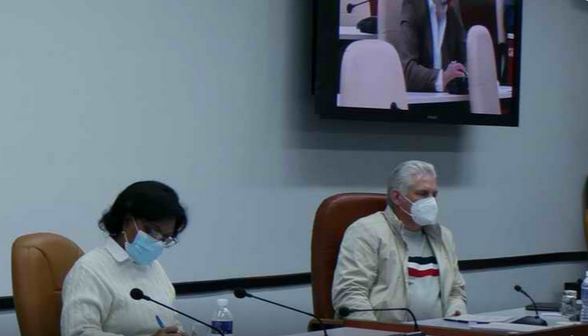
The First Secretary of the Central Committee of the Communist Party of Cuba and President of the Republic, Miguel Díaz-Canel held a meeting on Wednesday at the Palace of the Revolution in Havana with experts from the Social Sciences section of the Cuban Academy of Sciences.
Havana, February 3 (RHC)-- The First Secretary of the Central Committee of the Communist Party of Cuba and President of the Republic, Miguel Díaz-Canel held a meeting on Wednesday at the Palace of the Revolution in Havana with experts from the Social Sciences section of the Cuban Academy of Sciences.
Among the proposals they presented to the dignitary were the elaboration of a Policy of Integral Attention to Youth, and the creation of a Governmental Working Group in charge of its elaboration, integrating sectorial actions and accompanying its implementation.
"Here is an important contribution in this meeting that ratifies a group of issues on which we have been working on children and youth; and affirms that we have to go to the design of public policies, that studies must be conducted on problems related to this sector of society," Diaz-Canel said.
The head of state also referred to the indication given to the Ministry of Higher Education to make a proposal to make changes to the process of admission to that education, which contemplates a group of elements that provide more facilities to young people from families with certain vulnerabilities and social disadvantages.
Likewise, the President emphasized that in the work that has been done in the transformation of the neighborhoods, the problems of those who live there have also been evaluated.
"Likewise, a study has been made of all the programs promoted by Commander-in-Chief Fidel Castro, known as the Battle of Ideas, to know the current status of each one, to determine which ones are being improved, if any of them are no longer being implemented or if new ones should be developed," Díaz-Canel added.
He said that "all the debates we are promoting are indicating that we need a more educated, higher and more comprehensive response from all the institutions in the country that have to do with the attention to the youth universe; and that is corroborated by this research that has been presented and its results".
"I agree that we have to create a governmental working group for the attention to youth, from an integral vision, based on all the research that has existed for a long time", said the President of the Republic.
The research was presented by María Isabel Domínguez García, PhD, from the Center for Psychological and Sociological Research, who focused her presentation on "The generational challenge for the development of the Cuban social project".
The study focuses on how to guarantee the continuity of the social integration of the new generations for the development of the Revolution's project.
The expert commented that when analyzing the processes of social integration of young people there are key elements, such as education, migration, family emancipation projects, the inclusion of young people in productive jobs, and that this allows the execution of individual projects.
Dr. Domínguez García pointed out that historical contexts mark generational differentiation, and in the case of Cuba these stages have been defined as: pre-revolutionary (before 1959); the stage of triumph, consolidation and institutionalization (until 1989); and that of economic crisis and successive reforms after the fall of the Berlin Wall and the disintegration of the Soviet Union (from 1990 onwards).
Regarding the last period, she detailed that it has been crossed by the so-called Special Period; the Battle of Ideas, characterized by the emergence of new social programs; and finally, the updating of the Economic and Social Model.
The specialist pointed out that all these generational groups coexist in the Cuban population today. Her presentation then motivated a broad debate by scholars on the subject, from the perspective that generational continuity is a fundamental part of the unity defended by the Cuban revolutionary process.
Díaz-Canel, ratifying the importance of the main proposals presented at the meeting, called on scholars to address the issues of youth and childhood without stereotypes.

